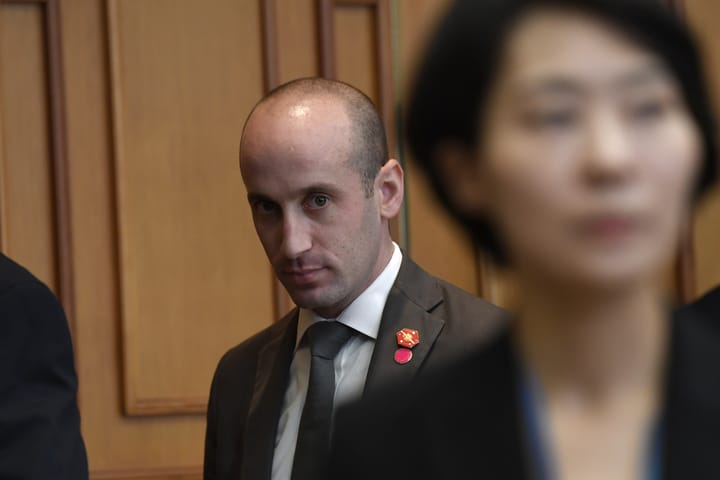As Ukraine suffers its worst bombardment yet, Trump complains about socks and semiconductor supply.
A third night of aerial bombardment over Ukraine has painted a grim portrait of Europe’s ongoing war. Russia's continued attacks, striking Kyiv, Odesa, Kharkiv, and beyond, have left residential buildings in ruins, civilians wounded, and the already-battered infrastructure of Ukraine further degraded. But amid the sirens and debris, it was not Vladimir Putin’s belligerence that dominated the headlines. As usual, it was Donald Trump.
On his perpetual campaign trail and at airport press briefings, the U.S. president’s words displayed his characteristic dissonance. He expressed frustration with Putin’s latest missile barrages—"I'm not happy with him," Trump said, after more than 360 drones and rockets struck Ukrainian cities, killing a dozen civilians. But his remarks quickly drifted. He shifted from lamenting civilian deaths to outlining a vision of American manufacturing focused on tanks, not textiles. And while his administration extended a reprieve on 50% EU tariffs until July, the backdrop of these statements suggests a foreign policy guided less by global stability and more by transaction and impulse.
Trump’s pattern is familiar: volatility packaged as deal-making, sympathy shadowed by equivocation. When asked about Putin, he oscillates between personal disapproval and the nostalgic invocation of a once-cordial relationship. "Always gotten along with him," he noted, as if friendship could coexist with missile strikes.
Ukraine, meanwhile, continues to burn.
The attacks mark a chilling escalation. Fire crews in the Kyiv suburb of Markhalivka pulled charred beams from the rubble of private homes. In Odesa, a 14-year-old boy was injured as drones ignited flames that consumed neighborhoods. In Khmelnytskyi, far from the front lines, industrial infrastructure was hit, a reminder that the Russian campaign is no longer confined to military targets or strategic objectives. This is pressure. Exhaustion. Attrition. According to some analysts, it might even be a sign of Russian desperation.
And yet, from the United States, there is only ambiguity. The White House’s official condemnation of the attacks was buried beneath layers of economic brinkmanship. Trump threatens tariffs, then delays them. He claims the U.S. will now focus on "AI and tanks," not "T-shirts and socks," while dismissing the textile industry as expendable. In the same breath, he asserts support for Ukraine and contemplates sanctions on Russia.
The result is a confused message to allies and adversaries alike: A president who decries bloodshed while refusing to draw red lines. A government that promises deterrence but opts for delay.
Predictably, markets reacted to trade developments rather than the war. European stocks surged on news that tariffs had been postponed. The euro rose. Analysts used to the erratic tempo of Trump’s economic threats shrugged off the inconsistency as part of the price of doing business in a geopolitically unstable world. But in Kyiv, there are no rallies. There is no reprieve.
Ukraine’s strategic patience is wearing thin. The drone and missile strikes reveal a Russian regime emboldened by the lack of consequences and increasingly anxious to achieve its goals after years of military failure. With each unchallenged escalation, Putin tests the limits of Western tolerance. Trump’s administration responds with headlines, not force. His posturing at Air Force One yields little more than ambiguity—no policy, strategy, or deterrent.
What does it mean to say, "I'm not happy with Putin," while continuing to describe him as someone you "get along with"? Nothing. It means nothing. It is a statement of emotion, not of statecraft. And it is dangerous.
It is dangerous because it signals to Ukraine that American support is negotiable. It is dangerous because it tells Russia that escalation may provoke irritation but not resistance. And it is dangerous because it substitutes rhetoric for responsibility.
Trump wants tanks, chips, and industrial glory. But the world is witnessing the manufacturing of confusion. Allies cannot tell where the United States stands, and enemies calculate accordingly. While Trump may see himself as a builder, he is dismantling the postwar fabric of transatlantic unity - and he has nothing to replace it. There are no cards up his voluminous sleeves.
When Ukrainian emergency services sweep debris from smoldering homes, they do not count tariff exemptions. When mothers flee Odesa with their children, they are not focused on EU-American trade balances. And when the air-raid sirens blare through the night for a third consecutive evening, they do not wonder whether Washington has extended the deadline to July 9.
They are wondering if help will come at all.
The Index is a reader-supported, indie publication.
Now, more than ever, the world needs an independent press that is unencumbered by commercial conflicts and undue influence.
By taking out an optional founding membership, you can help us build a free, accessible, independent news platform firewalled from corporate interests.



